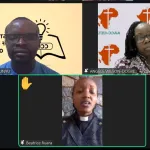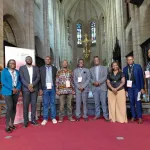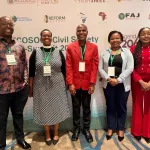Outcome Statement Continental Stakeholders Dialogue Meeting On Public Accountability & New Debts Crisis In Africa
Outcome Statement Continental Stakeholders Dialogue Meeting On Public Accountability & New Debts Crisis In Africa
OUTCOME STATEMENT
CONTINENTAL STAKEHOLDERS DIALOGUE MEETING ON PUBLIC ACCOUNTABILITY AND NEW DEBTS CRISES IN AFRICA
DATE: 22-26 AUGUST 2022
VENUE: DESMOND TUTU CONFERENCE CENTRE, NAIROBI, KENYA
Theme: “Do nothing out of selfish ambition…Consider others first” (Philippians 2:3)
Preamble
The All Africa Conference of Churches (AACC) held a Continental Stakeholders Dialogue Meeting on Public Accountability and New Debts Crises in Africa from 22-26 August 2022 in Nairobi, Kenya under the theme: “Do nothing out of selfish ambition…Consider others first” (Philippians 2:3). The purpose of the meeting was to facilitate capacity strengthening of selected representatives of member churches of AACC to effectively engage key stakeholders including governments on public debts and corruption in the continent and beyond.
Participants to the meeting included youth, women, men and Ministers of Religion. Experts and relevant key stakeholders drawn from the civil society, the African Union, Academia, Governments, Ethics and Anti-Corruption Commission members from African Countries facilitated the discussions.
The topics discussed were broadly on the Ethics of Debt and Accountability: A Call for Cultural Change in Africa’s Public Administration in Africa; Understanding Current Debates on Corruption and New Public Debt; Key Milestones, Challenges, Lessons and Recommendations from the African Union Convention on Preventing and Combating Corruption (AUCPCC); Public Sector, Public Debt, Corruption and Civil Society Organizations Engagement for Social Accountability; Pandemics as a Source of Public Debt Accumulation: The Case of COVID-19; Domestic Resource Mobilization as an Alternative to Public Borrowing to Avoid New Debts; Fighting Corruption Through Effective National Auditing Systems as well as Active Citizenship and Advocacy for Social and Economic Justice.
The religious leaders and the other actors present acknowledged that African countries are currently reeling under unsustainable public debts that are owed to individual countries and other international financial institutions. The participants noted that new debts have continued to balloon in the last few years with the climax being during the COVID-19 period.
The role of the Church and other religious communities in pursuit of social and economic justice in Africa, was underscored. Participants reiterated the importance of transparency and accountability in natural resource management in Africa to curb illicit financial and mineral flows which perpetuate Africa’s indebtedness.
In light of the foregoing, the religious leaders commit to;
1. Engage the AACC members in different countries in anti-corruption awareness campaigns to build an environment of good governance of national resources.
2. Use social media platforms for information dissemination to break the culture of corruption tolerance and impunity at local, national, regional and continental levels.
3. Increase networking opportunities of cooperation with Civil Society Organizations, Ethics and Anti-Corruption National Commissions and National Parliaments to foster the fight against corruption.
4. Hold local leaders accountable by creating a strong network of religious leaders fighting for accountability, transparency and prudent public debt management systems in Africa.
5. Use all available national fellowship gathering opportunities to advocate for anti-corruption measures.
6. Engage in high-level dialogue processes to promote and enhance meaningful participation and engagement in the corruption and public debt management discourses.
7. Engage and collaborate strategically with the African Union bodies to promote and enhance citizen’s awareness, sensitization, tracking implementation of policies around anti-corruption, public debt management and promotion of good governance.
8. Promote and engage interfaith dialogues on anti-corruption and public debt management.
Religious leaders call upon national African Governments to:
1. To closely work with their National Legislatures to strengthen national legal and policy frameworks to ensure transparency and accountability in public debt contraction and management.
2. Strengthen accountability systems to curb widespread corruption within African political and bureaucratic systems at various levels of society.
3. Respect and enforce mechanisms of their national Public Finance laws and constitutional provisions that govern pubic debt contraction and management.
END




